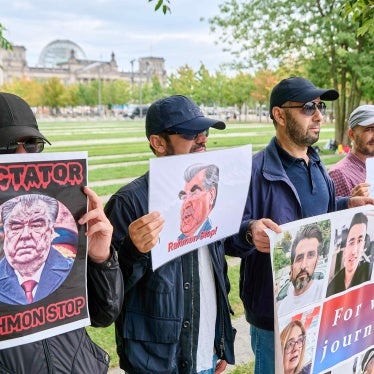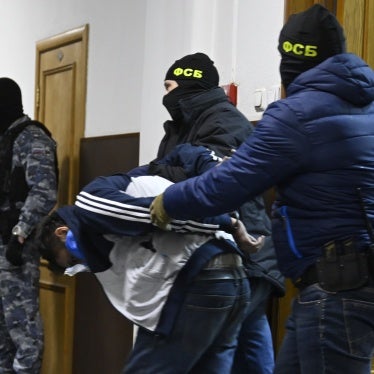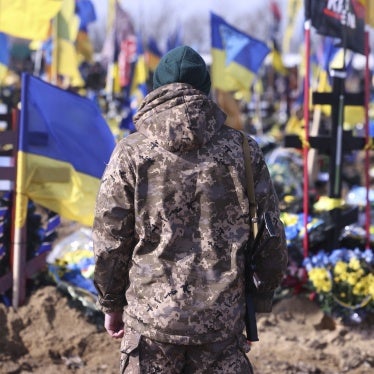To: Judge Kirushin Anatoly Konstantinovich,
Murmansk Province Court
Dear Anatoly Konstantinovich,
We are writing to you today in relation to the case of Yusup Kasymakhunov, an Uzbek national, who is currently in the process of appealing the decision of the Prosecutor General’s office from 19 of April 2012 to extradite Mr. Kasymakhunov to Uzbekistan. The appeal hearing is scheduled for May 18, 2012 at the Murmansk District Court.
Human Rights Watch is concerned that Mr. Kasymakhunov is at serious risk of mistreatment, including torture, in custody if returned to Uzbekistan. Torture is widespread and systematic in every part of Uzbekistan’s criminal judicial system, and people held on religion-related charges are often subjected to especially harsh ill-treatment, including torture. As you know Russia is strictly prohibited from expelling or extraditing a person to a country where they face a risk of torture or inhuman or degrading treatment. Russia is a party to three international treaties which enshrine that prohibition – the European Convention on Human Rights, the International Covenant on Civil and Political Rights and the Convention against Torture and Other Cruel, Inhuman or Degrading Treatment or Punishment. We strongly and unequivocally believe that the extradition of Mr. Kasymakhunov to Uzbekistan would be a violation of this fundamental legal obligation of Russia.
As you may know, Human Rights Watch is an international non-governmental organization that investigates and reports on human rights abuses in over 90 countries worldwide. Human Rights Watch has monitored the situation in Uzbekistan since the early 1990s and has maintained a field presence in Tashkent from 1996 until 2011 when the government expelled Human Rights Watch from the country. In this time, Human Rights Watch has produced many reports and other materials exposing the grave human rights situation in Uzbekistan, including intolerance for dissent of any kind and the systematic and widespread use of torture and ill-treatment in custody that persists to this day. Human Rights Watch continues extensive research and reporting on human rights issues in Uzbekistan, including fair trial standards, torture and treatment of religious prisoners.
For years Uzbekistan has waged an unrelenting, multi-year campaign of arbitrary detention, arrest, and torture of Muslims who practice their faith outside strict state controls. Over 100 were arrested or convicted in 2011 on charges related to religious extremism. Thousands more languish in prison – where conditions are very poor and torture is common place - for religion-related charges. The government justifies this campaign by referring to the “war on terror,” failing to distinguish between those who advocate violence and those who peacefully express their religious beliefs. Human Rights Watch has extensively documented the Uzbek government’s ruthless campaign against Muslims, including in the in a 2004 report “Creating Enemies of the State: Religious Persecution in Uzbekistan,” as well as in many subsequent documents (see https://www.hrw.org/reports/2004/uzbekistan0304/uzbekistan0304.pdf). Human Rights Watch has documented that those detained on religion-related charges face grave risk of arbitrary detention and, along with political prisoners, are subjected to particularly harsh treatment, including torture, in custody. According to testimony by relatives, prisoners are forced to sign statements begging President Islam Karimov for forgiveness, renouncing their faith, and incriminating themselves as terrorists. Prisoners who refuse are punished with beatings, time in punishment cells, and even new criminal prosecutions.
Since 2008, and as recent as December 2011, European Court of Human Rights has told Russia on 8 occasions, that to send an individual back to Uzbekistan would be a violation of Article 3 of the European Convention on Human Rights – that is the absolute prohibition on torture and inhuman or degrading treatment. (See cases Ismoilov and others v Russia, Application 2947/06, Judgment of 24/04/2008; Muminov v Russia, Application 42502/06, Judgment 11/12/2008; Yuldashev v Russia, Application 1248/09, Judgment 08/07/2010; Abdulazhon Isakov v Russia, Application 14049/08 Judgment 08/07/2010, Karimov v RussiaApplication 54219/08Judgment 29/07/2010; Sultanov v RussiaApplication15303/09, Judgment 04/11/2010; Yakubov v Russia, Application 7265/10 Judgment 08/11/2011; Ergashev v Russia, Application 12106/09 Judgment 20/12/2011).
All of the judgments cited above include extensive extracts from international bodies, such as the UN special rapporteur on torture which document the use of torture. In November 2011, the European Court of Human of Rights said:
“81.… in several judgments concerning expulsion or extradition to Uzbekistan it noted, with reference to materials from independent sources covering the time span between 2002 and 2007, that the practice of torture against those in police custody was “systematic” and “indiscriminate” (see, for example, Muminov and Ismoilov and Others, both cited above, §§93 and 121 respectively, with further references). In its recent judgments concerning the same subject, after having examined the latest available information, the Court pointed out that there was no concrete evidence to demonstrate any fundamental improvement in that area (see Abdulazhon Isakov v. Russia, cited above, §109; Yuldashev v. Russia, no.1248/09, § 93, 8 July 2010; and Sultanov v.Russia, no.15303/09, § 71, 4 November 2010).
82.The Government did not argue that the situation in Uzbekistan had improved during the period under consideration in the present case. Having examined recent materials originating from reliable and objective sources … the Court is also unable to find elements which would be indicative of such an improvement. Quite the contrary, it follows from the latest reports by Human Rights Watch, Amnesty International and the US Department of State, as well as the information of other organisations to which they refer in their documents, that the use of torture and ill-treatment against detainees in Uzbekistan is “systematic”, “unpunished” and “encouraged” by law-enforcement and security officers. According to those sources, despite the Uzbek authorities’ assertions that such practices had significantly decreased, reports of torture and ill-treatment of detainees and prisoners continued unabated …. Against this background the Court cannot but conclude that the ill-treatment of detainees remains a pervasive and enduring problem in Uzbekistan.”
The Court has also addressed the question as to whether the government of Uzbekistan could offer assurances that an individual would not be tortured as a safe guard against the risk of torture. The Court in Ergashev said
“114.As to the Government’s argument that assurances were obtained from the Uzbek authorities, the Court has already cautioned against reliance on diplomatic assurances against torture from a State where torture is endemic or persistent (see Chahal, cited above, and Saadi v. Italy [GC], no.37201/06, §§ 147-148, ECHR 2008-...). Given that the practice of torture in Uzbekistan is described by reputable international sources as systematic, the Court is not persuaded that the assurances from the Uzbek authorities offered a reliable guarantee against the risk of ill-treatment.”
The conclusion reached multiple times by the European Court of Human Rights, is further vindicated by Human Rights Watch’s latest report documenting human rights violations in Uzbekistan. In that report, ‘No One Left to Witness: Torture, the Failure of Habeas Corpus and the Silencing of Lawyers in Uzbekistan,’ released in December 2011, Human Rights Watch documented the continuing wide-spread use of torture and ill-treatment in pre-trial detention since the adoption of habeas corpus and other judicial system reforms in Uzbekistan in 2008, reforms that were supposed to help eliminate the use of torture. Additionally, the report documented the authorities’ crackdown on Uzbekistan’s legal profession, particularly against criminal defense lawyers who have dared to raise allegations of torture and take on politically sensitive cases. The report’s findings are based on an in-depth on the ground research and detailed personal interviews with over 100 torture victims, their relatives, lawyers, human rights defenders and governmental officials. In light of the above, Human Rights Watch strongly believes that Yusup Kasymakhunov would face real risk of severe mistreatment in custody, including torture, if returned to Uzbekistan.
Personal Circumstances of Yusup Kasymakhunov
In November 2004, the Moscow city court sentenced Yusup Kasymakhunov, born in 1964, to eight years of imprisonment for membership in Hizb ut-Tahrir al-Islami (The Party of Islamic Liberation). His sentence was later reduced to seven years and four months. After a higher court upheld his conviction in January 2005, Yusup Kasymakhunov filed an application to the European Court for Human Rights under Articles 9, 10, 11 and 14 (currently pending). Kasymakhmunov, a citizen of Uzbekistan, has been living in Russia since 1995.
Hizb ut-Tahrir is an international Islamic organization with branches in many parts of the world, including the Middle East and Europe. Hizb ut-Tahrir is banned in much of the Middle East, some Central Asian countries and Russia. Central Asian governments have taken particularly harsh stances, with Uzbekistan leading the way by arresting and sentencing thousands of alleged members to long prison terms, as described above.
For seven years and four months, Yusup Kasymakhunov served his sentence in three remote high security prisons in Russia. While Mr. Kasymakhunov was serving his sentence, the Uzbek authorities requested that Mr. Kasymakhunov remain in custody after his sentence is fully served (or in case of early release on parole), for the purpose of being extradited to Uzbekistan based on existing criminal charges against him in Uzbekistan. According to the Uzbek authorities, Mr. Kasymakhunov has been charged with membership in Hizb ut-Tahrir, for the period of 1994 to 1999, although he has been in Russia since 1995. Mr. Kasymakhunov has not been charged with a violent offense, either in Russia or Uzbekistan.
Yusup Kasymakhunov was due to be released in June 2011. Days before his release, he filed an application for asylum in Russia. The authorities rejected his claim as inadmissible because he was still serving a sentence for a crime, despite his specific request to consider the asylum application filed after his sentence was fully served, and not before. As a result, he was denied access to the asylum procedure just days before completing his sentence finished.
In June 2011, after serving almost seven and a half years in prison, Mr. Kasymakhunov was immediately detained again, this time as a restrictive measure applied to persons undergoing an extradition procedure, because the Uzbek authorities had formally requested his extradition. In April 2012, the Russian Prosecutor General’s office decided to extradite Mr. Kasymakhunov to Uzbekistan at the request of Uzbek authorities.
As we have indicated at the outset, the prohibition on return to torture is absolute. Mr. Kasymakhunov’s return would clearly violate this prohibition and Russia’s obligations under the European Convention on Human Rights, International Covenant on Civil and Political Rights and the Convention on Torture.
We therefore urge the court to take into account the prohibition on the return to torture, the real risk that Mr. Kasymakhunov would be tortured if extradited to Uzbekistan, Russia’s binding international legal obligations and therefore to block the extradition.
Respectfully yours,
HughWilliamson
Director, Europe & Central Asia Division
Human Rights Watch








